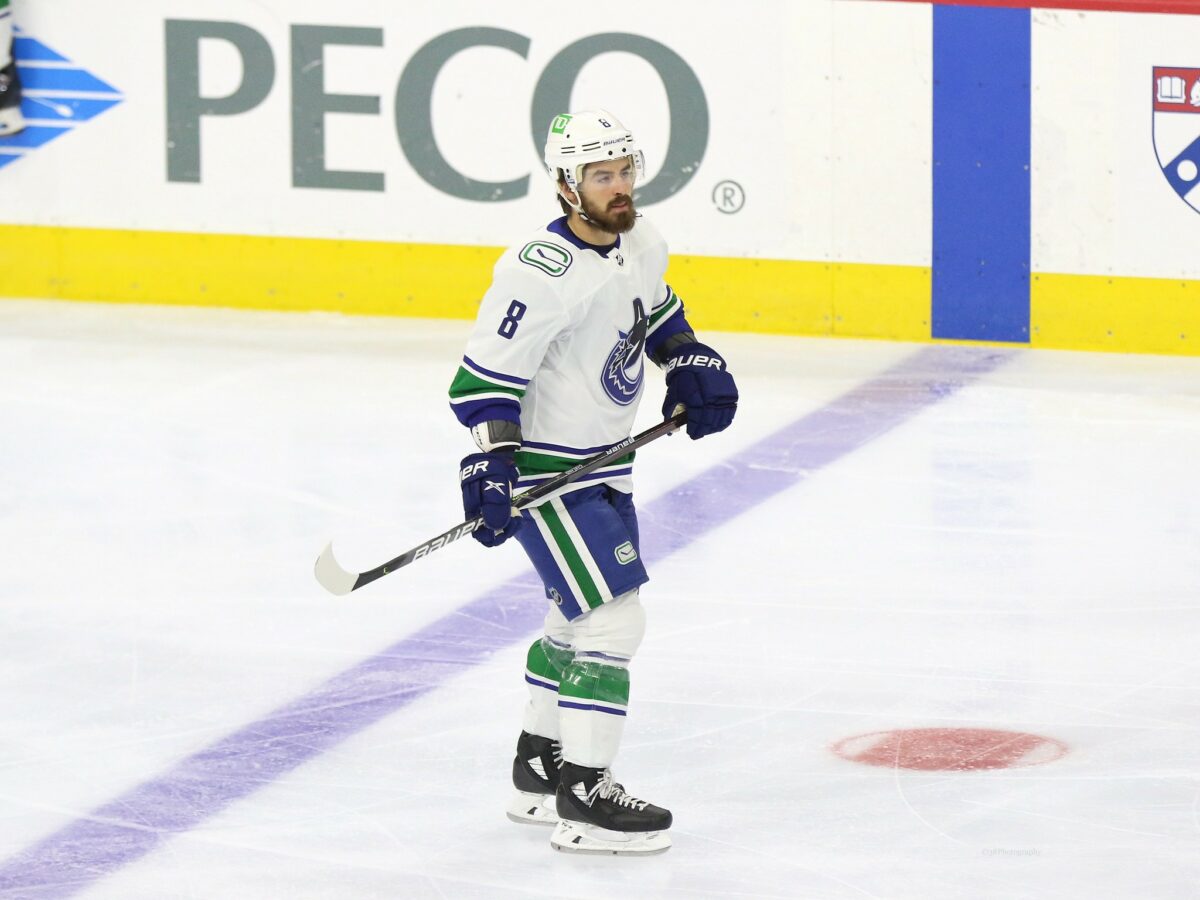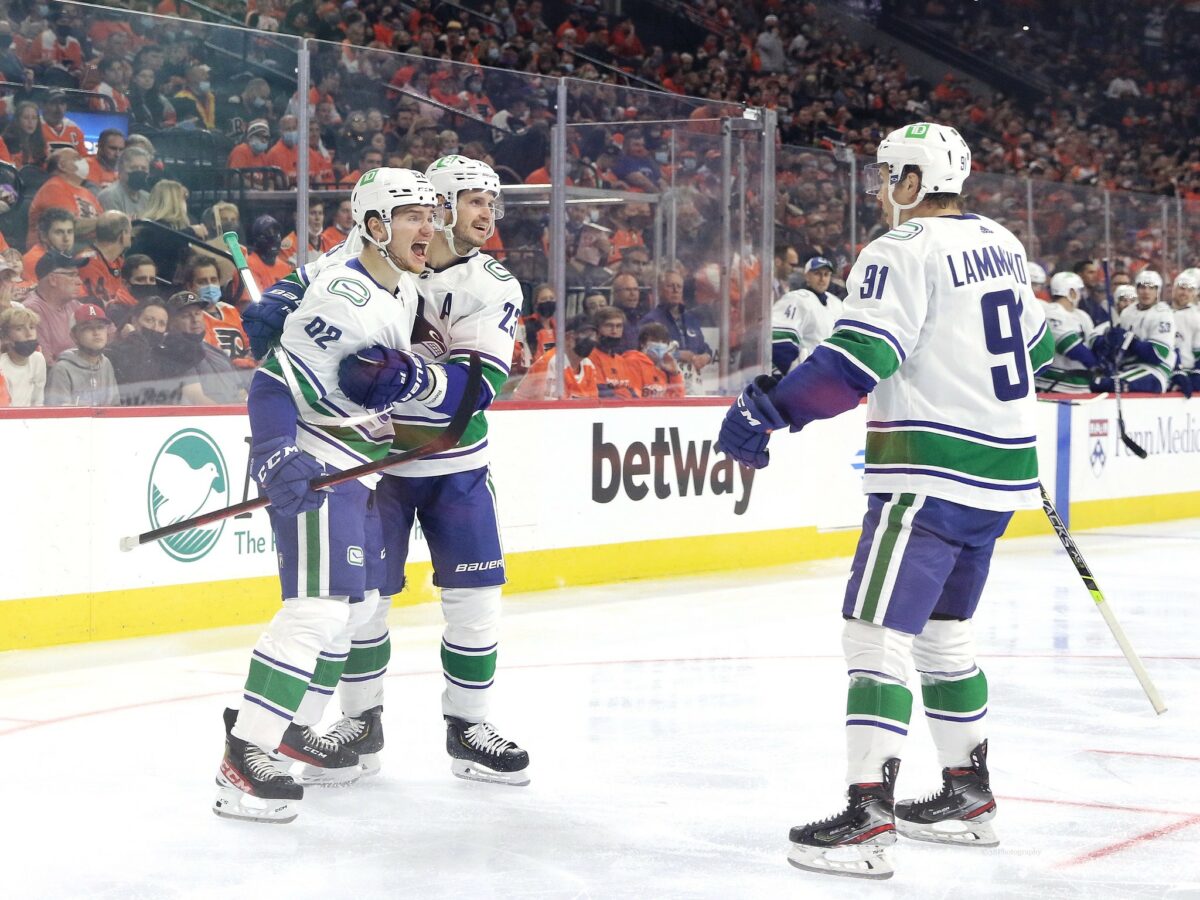It hasn’t been the type of season the Vancouver Canucks players, staff and fans were hoping for. With so much turnover in the offseason — from unloading contracts to bringing in players that were supposed to improve some areas of concern from a year ago — the hope was for Vancouver to take a step in the right direction to get back into playoff contention. With the rough start out of the gate, the Canucks need their forwards to step up and turn their season around.
The Canucks sit near the bottom of the league when it comes to goal scoring, ranking 28th in the league averaging just 2.36 goals per game (GPG). After winning two straight games against the Montreal Canadiens and Ottawa Senators, Vancouver fell back into the loss column, dropping a Saturday night matchup to the Pittsburgh Penguins 4-1. The team will need to find that winning touch if they want to salvage this season at all. In order to do that, they need their forward group to step up and drag them out from the near bottom of the standings. It can’t be just one or two players, but the entire forward group will have to step up to get the Canucks going.
Star Players Up Front Need to Step Up
The driving force of the offence has to run through the star players up front. While a few players have pulled their weight so far this season like J.T. Miler, who leads the team with eight goals and 23 points in 25 games, there are a number of others who have not lived up to expectations so far.
One of the most talked about Canucks over the offseason regarding his contract situation being a restricted free agent (RFA), was Elias Pettersson. Vancouver signed him to a three-year bridge deal with an average annual value (AAV) of $7.35 million, and after collecting 153 points through his first 165 games, Pettersson has not had the type of season that fans are used to. While he hasn’t been brutal, he is sitting at 12 points through the first 25 games. That’s less than .50 points per game (P/G), which is far off his average through his first three seasons (.98 P/G).

Brock Boeser had all the makings this season to be set up for success. Pettersson was back from an injured wrist that forced him to miss the final 30 games of last season, and was reunited with Miller as well on the top line to start the season. When that combination didn’t click, there were other options Vancouver had to play with. Players like captain Bo Horvat, second year player Nils Hoglander, newcomer Conor Garland and highly toughed rookie Vasily Podkolzin. Despite all these combinations, Boeser is still sitting at just 10 points through 22 games. it’s up to head coach Travis Green to find that right combination to get Boeser back to the player that averaged .84 P/G and the 20-goal threshold three times through his first four seasons.
Related: Canucks Should Avoid Jake DeBrusk
The captain and heartbeat of the franchise, Horvat needs to take advantage of playing with Garland on the top line along with centering the first power-play unit. It’s not that Horvat has been bad by any means, as he’s on pace for 43 points this season, but this is a guy who has scored 20-plus goals four times, topped 50 points three times and even 61 points in the 2018-19 season, where he had career highs in both goals and assists.
Canucks Need Secondary Scoring Depth
It can’t all be on the stars, however. There are players up and down the lineup to help lighten the load and spread the wealth with secondary scoring depth. One player in particular that has lived up to the task so far is Garland, who sits second on the team with seven goals and 18 points in 25 games and is now positioned on the top line for the Canucks. Outside of this, however, other players need to step up and have a bigger mark on the forward group.
You may also like:
- Canucks Draft Misses Since 2015
- Canucks’ Top 15 Prospects for 2024-25 Season
- Daniel Sprong: What to Expect From Canucks’ Newest Signing
- Vancouver Canucks Sign Daniel Sprong to 1-Year Deal
- 5 NHL Teams That Improved in Free Agency
There was a time where Tanner Pearson was a constant threat to score 20 goals. He did it with the Los Angeles Kings back in the 2016-17 season, scoring 24 times, and again was he was brought over to Vancouver in 2019-20 putting up 21 markers. But last year was a struggle for the 29 year-old, as he scored just 10 goals across 51 games. Now past the quarter mark of the season, Pearson is sitting at just four goals and eight points through 25 games, which puts him on a 13-goal pace. If Vancouver has any desires of being competitive in March and April, Pearson might have to be a guy that can score here and there, especially now playing with Horvat and Garland on the top line.

Alex Chiasson shouldn’t be expected to put up 20-plus goals, but he has done it, and just two years ago with the Edmonton Oilers. Being slotted on the fourth line isn’t going to give him a ton of opportunities, but he’s definitely a role player who can chip in here and there. Throughout his career, he’s averaged double-digit goals, including his rookie year where he played in just seven games with the Dallas Stars. No, he should not be the next man up after the star forwards, but if he can get into the early teens in goal scoring, it gives Vancouver a luxury down their lineup averaging 10:14 time on ice (TOI) per game.
Youth and Exuberance
Whether it’s sophomores looking to make a bigger impact, or rookies trying to make their mark, the youth and exuberance from Vancouver needs to try and carve out a larger role offensively.
As a sophomore this season, Nils Hoglander has gotten off to a similar start as he did in his rookie campaign. In 25 games so far this season, he’s put up 10 points, slightly off his production from a year ago at nearly .50 P/G, with 27 points across 56 games. With some additional ice time, and currently playing with Pettersson on the third line, now is the time for Hoglander to take advantage and see if he can take a step forward in Year 2.
There was a lot of hype during training camp surrounding Vasily Podkolzin and his offensive abilities, but it’s been a tougher transition on the stat sheets. With six points through 22 games, many Canucks fans were expecting a bit of a faster jump. However, at just 20 years of age, expectations should be tempered as there are a vast number of other players the Canucks should look to first. But with the opportunity of playing on the second line with Miller and Boeser, now is as good a time as ever to get on the stat sheet a few more times.

(Amy Irvin / The Hockey Writers)
Whether it’s the star players, secondary scoring options or the youth amongst the Canucks lineup, Vancouver’s many issues can be attributed to not putting the puck in the net and their lack of confidence. If the struggles continue, this season could drag out even longer than fans and players wanted it to in the first place.